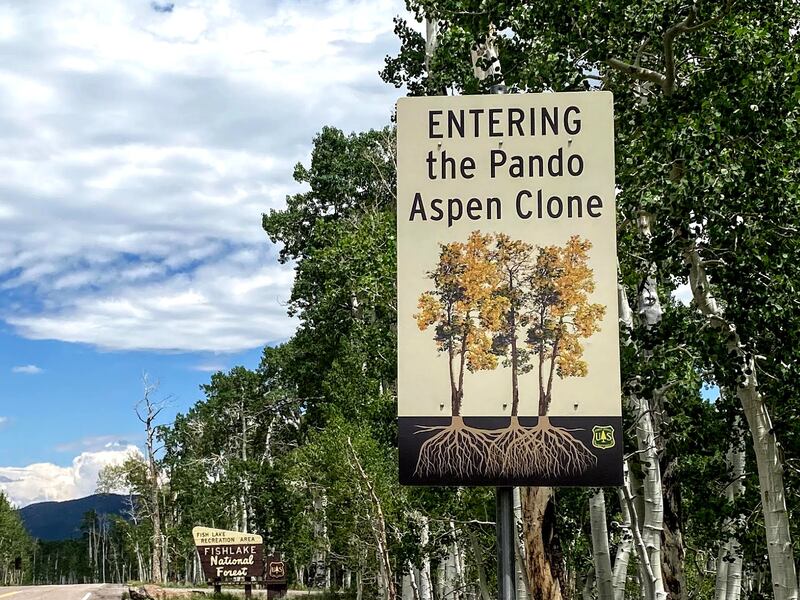It’s unfortunate, but sometimes in government things can get overlooked. One great example is that until 2014, the official state tree of Utah was the Colorado blue spruce.
I’m still not sure how that happened, but it definitely needed to be corrected.
While I admit we face bigger challenges than designating a state tree, legislators and other state officials agreed that there simply had to be better options that didn’t carry the name of a neighboring state. That year, the quaking aspen tree was given the official designation as our state tree. In recent months, I’ve been thinking about how suitable the quaking aspen is as a symbol of our state and the people who live here.
Nearly 200 miles south of Utah’s capital city you will find the world’s largest living organism, known as Pando. On the surface, Pando, also referred to as the Trembling Giant, looks like a magnificent grove of quaking aspen trees. In reality the trees are part of one large colony of quaking aspen which scientists have determined to be a single living organism.
It is this interconnection that I find most characteristic of Utah. Like Pando, Utah benefits greatly from deep roots that sustain a community. While other parts of the country embrace a new-normal of isolation — often not knowing their next door neighbors — Utah is a place where community, charity and service are part of the culture. Being connected to a common foundation is a tremendous advantage to life in Utah.
Also like the Trembling Giant, Utahns benefit from growing together. Pando didn’t start as a 106-acre, 600-metric-ton tree. It began, as all trees do, as a seed. Over the 14,000 years scientists believe it to have been in existence, it has grown, slowly and surely, to become what it is today. Through those years it has sprouted 40,000 trunks, with older ones dying off and new ones growing as replacements. Likewise, Utah continues to see new industries, businesses, communities and traditions sprouting from our shared foundation, each making our state grander to behold and better to live within.
My admiration for Pando also leads me to consider what it takes to grow and thrive over such a long period of time.
Last month, Arthur C. Brooks, the former president of the American Enterprise Institute and Beth and Ravenel Curry Scholar in Free Enterprise, and now a bestselling author and social scientist studying happiness, visited Utah. He talked about the two types of intelligence we gain throughout our lives and how they contribute to our happiness. In his latest book, “From Strength to Strength,” Brooks teaches that, early in our lives, we have a high level of fluid intelligence, which he says includes the ability to reason, think flexibly and solve problems. The second type of intelligence is what Brooks calls crystalized intelligence, or the ability to draw upon a wealth of knowledge gained from experience.
Brooks makes the case that the secret to long-term happiness is to transition from fluid to crystalized knowledge in the service of one another, our families and our communities.
I’ve seen that proven out in Utah over and over again. I think of Larry and Gail Miller who took on a significant financial risk to ensure the Jazz would remain in Utah, strengthening our sense of community. I think of the early business success stories in our own Silicon Slopes and the founders who extolled the benefits of Utah to bring economic growth here when it would have been easier to join the party in Silicon Valley. And I think of the lesser-known but equally important people who serve without fanfare in their communities as members of the city council, school board, PTA or as engaged and caring parents and neighbors.
This Thanksgiving season, as we pause to appreciate life’s numerous blessings, I hope we will all remember how fortunate we are to live in such a beautiful, prosperous community, and that we will give thanks for those who share their experience and wisdom to help guide us through the challenges we face.
I am grateful for the opportunity to serve and to work alongside dedicated public servants, community leaders, world class educators, dedicated parents and advocates for many good and worthy causes.
Utah’s strength is found in our common roots and our determination to pass along what we’ve learned through study and hard-earned experience to benefit the younger generation and the generations to come. That’s how we have become what we are and how we will become something even better in the years and decades ahead.
Brad Wilson is the speaker of the Utah House of Representatives.

